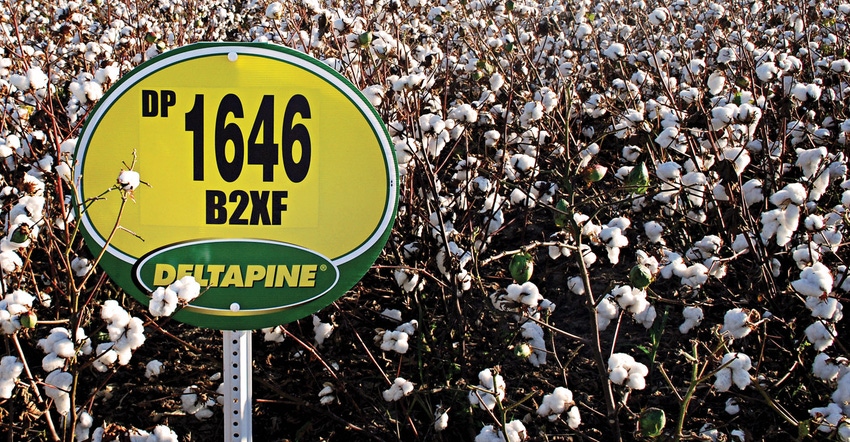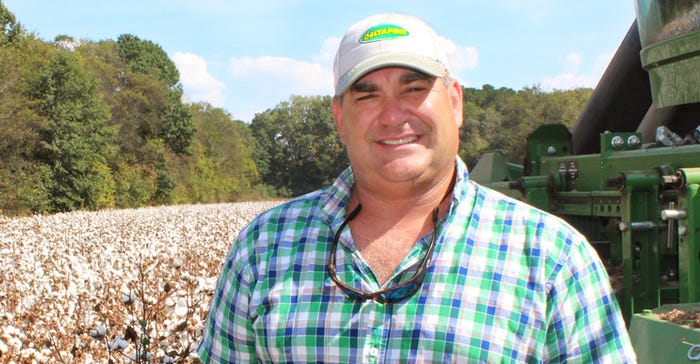January 28, 2020

Sponsored Content
On June 19, Lee Lasater was in a self-propelled sprayer, making herbicide applications to his northeast Alabama cotton fields. Along with his cousin, who helped haul water, that’s all it took.
“I basically spray the fields by myself with one sprayer,” Lasater said. “That’s how easy weed control has become for us since we adopted the Roundup Ready® Xtend Crop System.”
Lasater is part of a family farm near Hazel Green, Alabama, just two miles south of the Tennessee state line in what’s known as the Tennessee Valley. Like many areas in the South, this row-crop region of northeast Alabama has been hit hard by resistant Palmer amaranth. Before he began planting Bollgard® 2 XtendFlex® cotton, weed management was expensive and time-consuming, even requiring hand-pulling weeds at times. After planting cotton with XtendFlex Technology in 2016, Lasater’s family farm has seen clear benefits.
“The [Roundup Ready] Xtend Crop System has helped us become much more efficient at controlling weeds,” he said. “Before we could spray dicamba herbicides in cotton, weed control was tough.”

Consistent Performance
Along with effective weed control, Lasater believes there must be results in terms of yield potential and fiber quality in the varieties he plants. When he selects varieties to plant, he looks for strong vigor for no-till fields, the ability to handle drought stress during the summer and consistent yield potential and fiber quality. He has found all of these things in the two Deltapine® varieties he plants.
“We are consistently making three-bale cotton around here, and it goes back to the genetics of cotton with XtendFlex Technology,” said Lasater. “We plant DP 1725 B2XF, which we like for its early maturity on dryland fields, and DP 1646 B2XF, which has performed very well under our center pivots.”
DP 1725 B2XF has an earlier maturity than DP 1646 B2XF, allowing Lasater to start harvest on fields planted to DP 1725 B2XF while he waits on DP 1646 B2XF to mature.
“We’re growing DP 1646 B2XF and DP 1725 B2XF because of their consistency, fiber grades and the ability to control weed breakthroughs with dicamba,” he said. “The yields have been phenomenal. Consistency is very important these days.”
The 2019 season, for Lasater, featured very light insect pressure and plenty of rainfall early before the typically dry, hot summer set in. Weed pressure wasn’t bad, and XtendiMax® herbicide with VaporGrip® Technology (Restricted Use Pesticide) took care of the weeds he had. Perfect harvest conditions greeted him in October.
His early-harvested dryland field planted to DP 1725 B2XF averaged 1,500 pounds per acre, according to gin receipts. His later-harvested fields of irrigated DP 1646 B2XF pushed 1,700 pounds per acre.
“Deltapine cotton with XtendFlex Technology has held up well in the conditions we face in the Tennessee Valley,” said Lasater. “We like the cotton varieties we’re currently planting.”
Record Yield
Just 72 miles to the west, Tony Gargis, Sr. and his son, Tony Jr., face similar growing conditions. The 2019 season threw three month-long dry spells at the father-son team, from April 15 to May 15, July 15 to August 15, and then again in September as the crop was finishing up. Despite the conditions they faced, one 271-acre dryland field planted to DP 1646 B2XF averaged 2,200 pounds per acre.
“It’s the best cotton I’ve ever raised, and I’ve been farming for 50 years,” said Tony Sr. ��“It was just the fifth crop on the field, which was in pastureland previously, so [it was] very fertile ground. Normal dryland yield is 900 pounds per acre around here, but we had another farm a mile or so away that picked three bales to the acre.”
Making PGR applications at pinhead square on DP 1646 B2XF was key to helping the Gargis duo get plant growth under control and set the variety up for top yield potential, said Tony Sr. They used an aggressive PGR approach to manage the variety and ended up with 105 ounces on the crop in 2019.
“This variety is very consistent, and we’ve just learned how to manage it,” he said. “To make two and a half bales per acre is one thing, but to make four and a half is something else.”
To see more success stories, visit Deltapine.com.
Monsanto Company is a member of Excellence Through Stewardship® (ETS). Monsanto products are commercialized in accordance with ETS Product Launch Stewardship Guidance, and in compliance with Monsanto’s Policy for Commercialization of Biotechnology-Derived Plant Products in Commodity Crops. This product has been approved for import into key export markets with functioning regulatory systems. Any crop or material produced from this product can only be exported to, or used, processed or sold in countries where all necessary regulatory approvals have been granted. It is a violation of national and international law to move material containing biotech traits across boundaries into nations where import is not permitted. Growers should talk to their grain handler or product purchaser to confirm their buying position for this product.
ALWAYS READ AND FOLLOW PESTICIDE LABEL DIRECTIONS. It is a violation of federal and state law to use any pesticide product other than in accordance with its labeling. NOT ALL formulations of dicamba or glyphosate are approved for in-crop use with cotton with XtendFlex® technology. ONLY USE FORMULATIONS THAT ARE SPECIFICALLY LABELED FOR SUCH USES AND APPROVED FOR SUCH USE IN THE STATE OF APPLICATION. May not be approved in all states. Contact the U.S. EPA and your state pesticide regulatory agency with any questions about the approval status of dicamba herbicide products for in-crop use with cotton with XtendFlex® technology.
Cotton with XtendFlex® Technology contains genes that confer tolerance to glyphosate, dicamba and glufosinate. Glyphosate will kill crops that are not tolerant to glyphosate. Dicamba will kill crops that are not tolerant to dicamba. Glufosinate will kill crops that are not tolerant to glufosinate. Contact your Bayer dealer or refer to the Technology Use Guide for recommended weed control programs.
B.t. products may not yet be registered in all states. Check with your seed brand representative for the registration status in your state.
Performance may vary from location to location and from year to year, as local growing, soil and weather conditions may vary. Growers should evaluate data from multiple locations and years whenever possible and should consider the impacts of these conditions on the grower’s fields.
Insect control technology provided by Vip3A is utilized under license from Syngenta Crop Protection Ag. LibertyLink® and the Water Droplet Design® is a trademark of BASF Corporation. Bayer, Bayer Cross Design, Bollgard II®, Bollgard®, Deltapine®, Respect the Refuge and Cotton Design®, Roundup Ready® and XtendFlex® are registered trademarks of Bayer Group. All other trademarks are the property of their respective owners. ©2020 Bayer Group. All rights reserved.
About the Author(s)
You May Also Like




